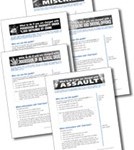The ABC’s of Drinking & Driving Offences
 Wondering about drinking and driving laws? How much alcohol in your system makes it okay for you to drive? Drinking and driving legislation is a very complex area of law, where both provincial (BC Motor Vehicle Act) and federal statutes (Criminal Code of Canada) apply, depending on the circumstances.
Wondering about drinking and driving laws? How much alcohol in your system makes it okay for you to drive? Drinking and driving legislation is a very complex area of law, where both provincial (BC Motor Vehicle Act) and federal statutes (Criminal Code of Canada) apply, depending on the circumstances.
The British Columbia branch of the Canadian Bar Association features a recently updated Dial-a-law script titled Drinking & Driving that outlines the rights and responsibilities of someone who is stopped by the police and suspected of driving under the influence.
Essentially, if you do drink and drive you can face three serious criminal charges:
(a) displaying blood-alcohol level of over .08 or over eighty
(b) demonstrating impaired driving due to alcohol or drug consumption, and
(c) refusing to provide a breath sample without a lawful excuse.
What to do if you are charged with a drinking & driving offence , a guide published by LSS, is a good starting point for those interested in what happens when someone is charged with drinking and driving under the Criminal Code. In summary, this guide explains the type of charges that apply, offers a checklist of what the prosecution must prove in court, outlines the steps involved in defending yourself in court and what sentence one can expect if found guilty.
Both guides emphasize the complicated nature of drinking and driving offences and encourage clients to seek legal advice when necessary.


